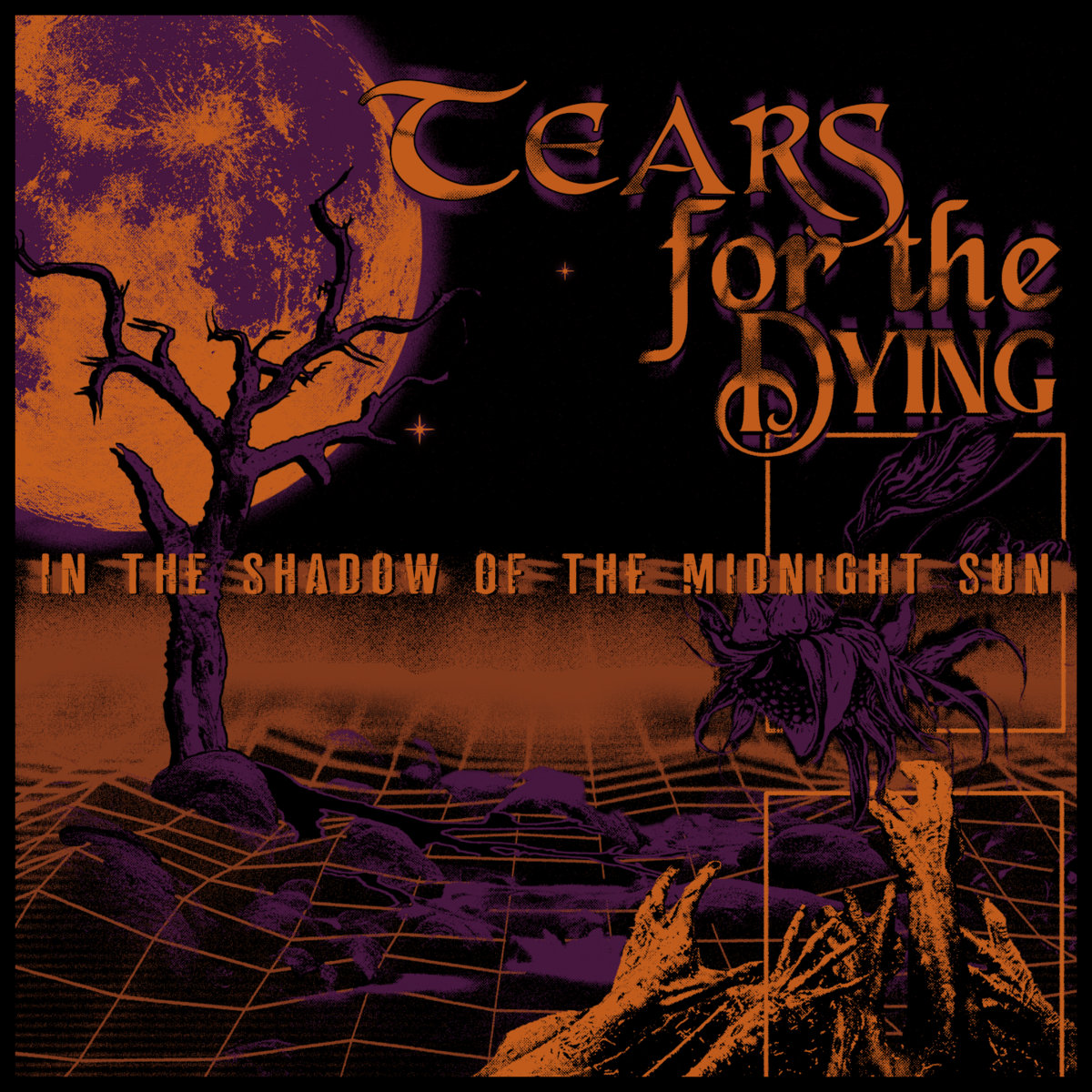I wanna throw my life in a fire
Heterochromia!
Hope and despair
Balance back out to zero
Within the dark embrace of deathrock and gothic music, where deep melodies and introspective lyrics intertwine, lies a distinct solace for those wrestling with mental strain. Far from merely reveling in nocturnal sorrow, it’s the shared recognition of suffering that bridges the gap between souls, fostering empathy and cathartic connection. The subculture’s poetic musings delve into the darker aspects of existence and become a profound haven of comfort, acknowledging the complexity of emotional distress and providing a sanctuary where one’s inner struggles are not only recognized but deeply understood.
Athens, Georgia gothic rock trio Tears For The Dying (Adria Stembridge, Joshua Broughton, and Mick Payne) tosses their bat into the dark carnival of life with In the Shadow of the Midnight Sun, their first full-length release since 2021, out now via Classic City Vinyl/Bat-Cave Productions.
In the Shadow of the Midnight Sun addresses the complexities of mental health, blending struggles and triumphs with reflective insights. The band’s goal is for the album to create a bond of connection and understanding, allowing listeners to see their own mental health experiences mirrored in the music. They hope this album will contribute to the wider conversation on mental well-being, offering listeners a way to process and relate to their personal challenges, and fostering empathy and awareness in the broader community.
The opening track, We Are the Darkness, is a maelstrom of guitars and vocals that channels cosmic horror through a narrative about extraterrestrials drawn to human malevolence, encapsulating themes of otherworldliness and societal critique.
Dagger in God’s Back is a caustic intermezzo, with wailing guitars and vocals with terse and vivid lyrics about consuming the divine and transforming into something ethereal in rebellion.
The brief and angst-laden cry for help that is Jisatsu delves into dark and emotive themes, likely touching on despair and the contemplation of self-harm, an ordeal many in the trans community endure, but thankfully not alone. Its title, which means ‘suicide’ in Japanese, hints at a deep exploration of personal turmoil and the struggle with inner demons and society as a whole. (If you are struggling, please reach out)
The journey through existential crisis and worsening mental state with the baroque Heterochromia. Next, the rhythmic Bloat unfolds as a harrowing tale of an individual beleaguered by a lifetime of bullying, culminating in a tragic end. Yet, in a macabre reversal of fate, the story takes an unexpected turn. The protagonist’s main tormentor from high school, who has since become a police officer and first responder, is confronted with her body. In a chilling twist, she reanimates, seizing the opportunity to rectify past wrongs in a grisly resolution, ensuring she has the final word in this dark saga.
Tears for the Dying’s bandleader Adria turned to the study of a foreign language as a lifeline during a challenging 2021, leading to the creation of Don’t Wanna and Ikinokotta with lyrics written in Japanese. This method of coping underscores the transformative power of engaging in beloved activities, particularly those that stimulate learning or physical movement, to shift our brain’s neural pathways from detrimental cycles toward healthier habits. This transition is palpable in Don’t Wanna, which captures the pivotal moment of rejecting a life overshadowed by depression and despair. The song, brief yet profound, acts as a metaphorical light switch, illuminating a path from darkness to clarity with its straightforward lyrics and resonant message. Ikinokotta. which translates to I Survived, is a song about surviving our worst mental health nightmares, surviving, and growing to become a better person.
The latter half of In the Shadow of the Midnight Sun marks a distinct shift in tone, beginning with Dead Girl Dancing. which celebrates dance as a powerful therapeutic escape from anxiety and depression. It suggests that even simple activities like a solitary walk or a leisurely stroll with a friend, whether through a serene cemetery or along a nature trail, can significantly uplift our spirits and transform our perspective.
Kaiju, drawing inspiration from the anime film End of Evangelion, showcases a pivotal shift in the band’s songwriting approach. The track prominently features an intricate blend of synthbass, synths, and guitars, all layered over a foundation of dynamic drums. This composition marks a notable departure from previous styles, embracing a rich, textured sound that captures the essence of its cinematic influence.
Higanbana addresses the challenge of accepting life’s unforeseen and often unwelcome changes. Drawing from personal experiences, the songwriter recounts the heartache of watching her father battle with dementia and a close friend’s parents struggle against cancer. These personal encounters highlight the cruel realization of facing an inevitable fate with little hope from science or medicine. Yet, Higanbana also offers a sense of comfort in recognizing that, as long as we are alive, we have the opportunity to make a meaningful impact in the world. On this track, guitarist Joshua Broughton’s swelling guitars adds a certain depth, complexity and beauty.
The closing track of In the Shadow of the Midnight Sun offers a surprising twist: a cover of Dolly Parton’s iconic Jolene, paying homage to the explosive rendition by the Sisters from the ’90s. However, Tears For The Dying takes a bold step away from the original, transforming the classic’s feel and tempo entirely. Adding a personal touch, the famous finger-plucked guitar riff that defines Parton’s version is masterfully executed by Adria’s uncle, Chip Stembridge, also known as Chip Young. This reinterpretation serves as a tranquil finale to the album, providing a serene closure to the emotional journey.
The mixing phase of the album saw contributions from Subvon Studio and Tom Ashton, renowned for his involvement with the iconic goth band The March Violets. However, when Ashton rejuvenated The Violets, the search for a new mixer led to another Athens, GA luminary: Jason NeSmith, celebrated for his affiliation with the post-punk Pylon Reenactment Society, who graciously assumed the mixing responsibilities for the remaining tracks.
The mastering process was entrusted to Chase Park Transduction in Athens, ensuring the album’s sound was refined and cohesive. The vinyl version of the album was pressed by a local Athens, GA plant, maintaining the production’s ties to the vibrant local music scene.
In the Shadow of the Midnight Sun is out now.
In the Shadow of the Midnight Sun by Tears for ʇhe Dying
Tears for the Dying are embarking on a tour throughout Florida this month, and an East Coast tour this May alongside their friends Vision Video. See full dates below.
Tour Dates:
Mon, Feb 26 – Gainesville, FL @ High Dive
Tue, Feb 27 – St. Augustine, FL @ Cafe 11
Wed, Feb 28 – Tallahassee, FL @ 926 Bar
Thu, Feb 29 – Tampa, FL @ New World Brewery
Fri, Mar 1 – West Palm Beach, FL @ Respectable Street
Sat, Mar 2 – Orlando, FL @ Conduit
Thu, May 9 – Detroit, MI @ Smalls
Fri, May 10 – Baltimore, MD @ Metro Gallery
Sat, May 11 – Hamden, CT @ Space Ballroom
Sun, May 12 – New York, NY – TBA
Mon, May 13 – Richmond, VA @ Richmond Music Hall
Tue, May 14 – Durham, NC @ The Pinhook
Wed, May 15 – OFF
Thu, May 16 – Charlotte, NC @ Snug Harbor
Fri, May 17 – Nashville, TN @ Mil at Cannery Row
Sat, May 18 – Atlanta, GA @ Masquerade (Hell)
Follow Tears For The Dying:
Instagram
Spotify
Bandcamp
YouTube
Website
The post Through the Darkness of the Mind — Listen to Tears for the Dying’s “In the Shadow of the Midnight Sun” appeared first on Post-Punk.com.




